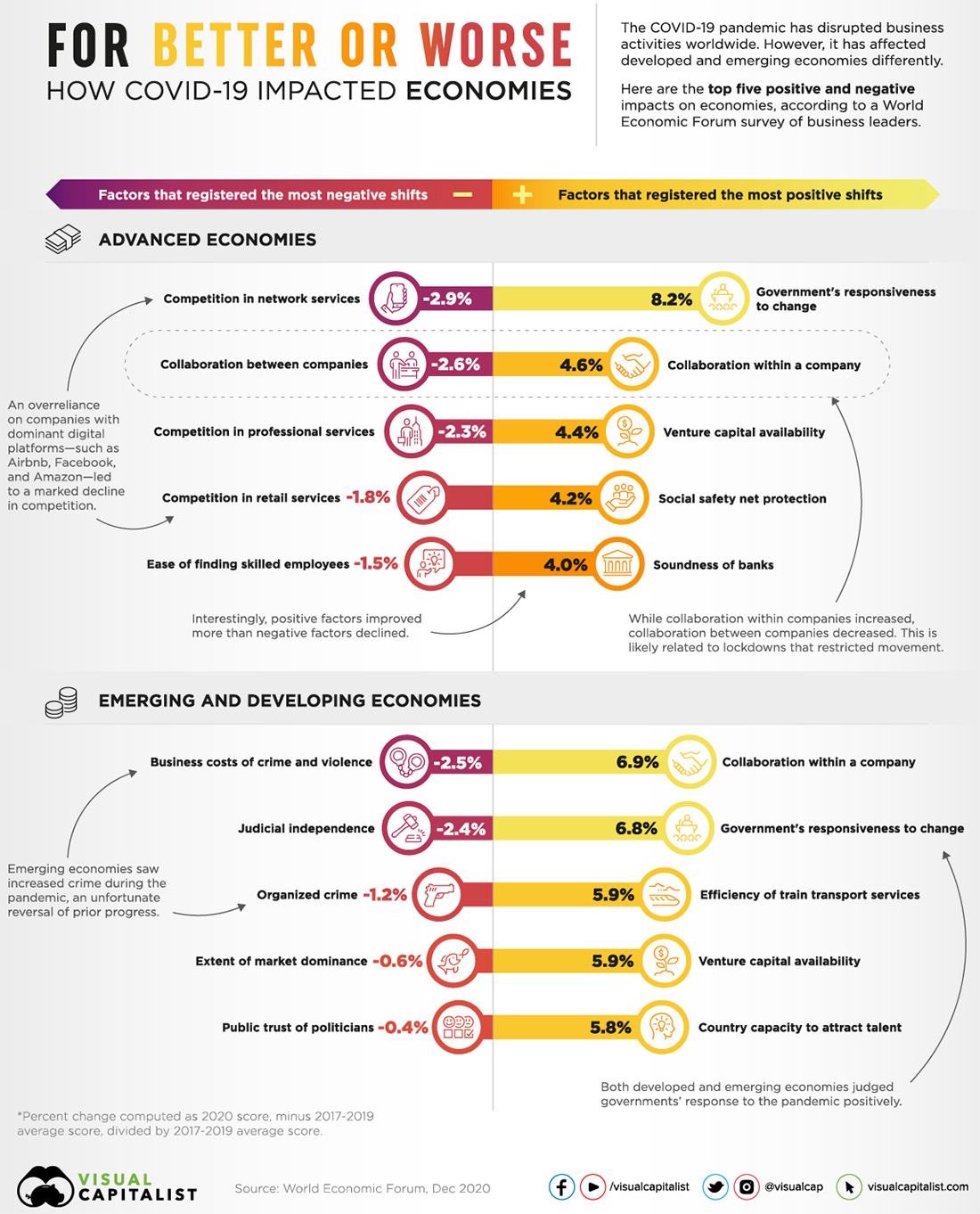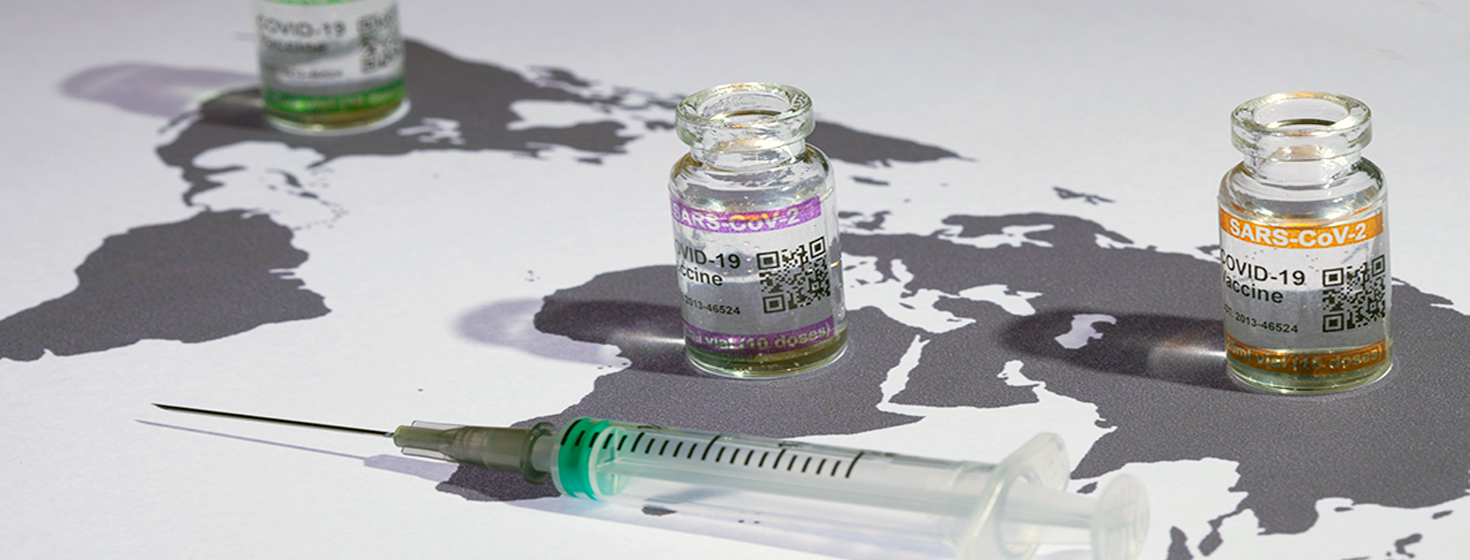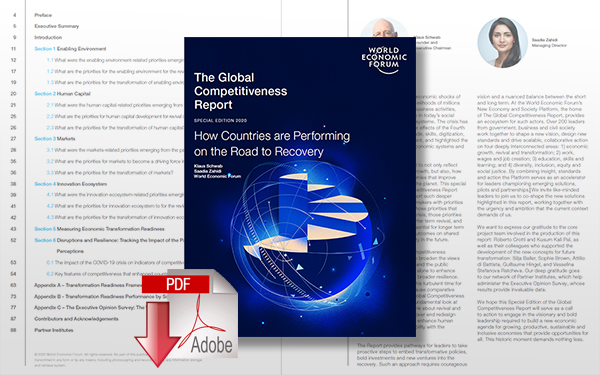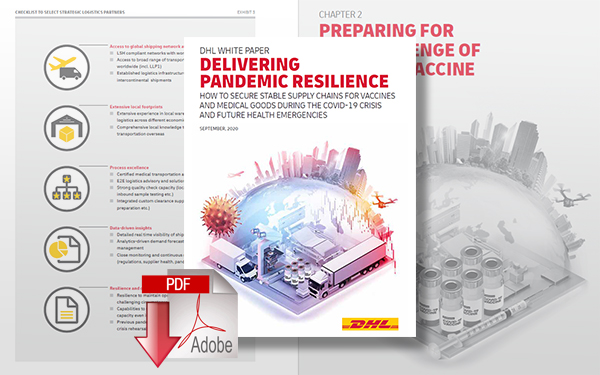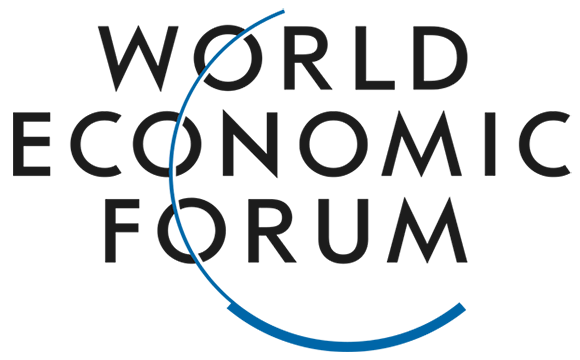Business Leaders Voice the Economic Impact of COVID-19

While the impacts of COVID-19 varied between advanced and developing economies, business leaders across the board identified some common features that helped countries remain resilient.
The Economic Impact of COVID-19: Positives and Negatives
The global pandemic has disrupted business activities worldwide. But COVID-19’s economic impact has varied across regions, and the consequences have been largely dependent on a region’s economic position.
Using survey data from the World Economic Forum’s 20th Global Competitiveness Report, this graphic showcases the economic impact of COVID-19 worldwide.
This year’s survey was conducted between February and July 2020 and includes responses from 11,866 business executives across 126 economies.
As you’ll see, the data was collected with the specific focus of contrasting the pandemic’s effects on developing economies compared to advanced economies.
Top Negative Impacts of COVID-19
By comparing business leaders’ responses in 2020 to their answers over the last three years, some clear trends have emerged.
In advanced economies, the top negative economic impact of COVID-19 has been a decline in competition, followed by a reduced collaboration between companies and a growing challenge in finding and hiring skilled workers:
What’s Driving this Reduced Competition in Advanced Economies?
One factor could be the increased use of online platforms. Ecommerce is heavily dominated by a select number of retailers. Because of this, bigger retailers like Amazon have seen massive boosts in their online sales, while many smaller brick-and-mortar businesses have been struggling.
While negative impacts on advanced economies are centered around market concentration and talent gaps, developing countries have faced different problems this year, like increased crime and governance issues:
It’s important to note that in the 2018 and 2019 surveys, organized crime and business costs related to crime and violence were trending downward. Because of this, the World Economic Forum suggests that we consider this year’s increase in these areas as a temporary COVID-induced setback rather than a long-term issue.
Top Positive Impacts of COVID-19
Despite the struggles brought on by COVID-19, the pandemic has also triggered a positive change. In fact, business leaders perceived more positive developments this year than negative ones.
In advanced economies, the top positive impacts were government responsiveness to change, followed by internal collaboration within companies:
Interestingly, internal collaboration improved while external collaboration got worse. This is likely because companies had to adapt to changing work environments, while also learning how to collaborate with one another through remote working.
The internal collaboration didn’t just improve in advanced economies. In fact, developing economies experienced several of the top positive impacts that advanced economies saw as well:
While perceptions of official responsiveness to change increased, public trust in politicians decreased slightly. This indicates that, while government responses to COVID-19 may have been received well in developing economies, overall feelings towards political leaders did not waiver.
How Have Countries Stayed Strong During the Pandemic?
While the impacts of COVID-19 varied between advanced and developing economies, business leaders across the board identified some common features that helped countries remain resilient:
- Economic digitization and digital skills - Social distancing has been a key response to the pandemic. Because of this, countries that were set up for remote work have fared better than others. Netherlands, New Zealand, and Finland are a few examples.
- Safety nets and financial soundness - Countries with established support systems for companies and citizens were in a better position to keep their economies afloat. Denmark and Norway provided much-needed support to their households, while Taiwan and the U.S. were able to aid businesses thanks to strong financial systems.
- Governance and planning - Balancing health priorities with economic and fiscal policies was a delicate dance this year. Countries that provided relatively stable political frameworks were Singapore, Luxembourg, Austria, and the United Arab Emirates.
- Healthcare system and R&D - A strong healthcare system meant widespread access to health services needed during the pandemic, as well as established public health protocols. Japan, Spain, and Taiwan were good examples of this.
Will these key features of competitiveness remain effective measures of a strong economy in 2021, or will our benchmarks for success evolve post-pandemic?
Source:The Economic Impact of COVID-19, According to Business Leaders
Related Article: The Logistics Challenges of COVID-19 Vaccination Distribution
Related White Papers
How Countries are Performing on the Road to Recovery
This report provides pathways for leaders to take proactive steps to embed transformative policies, bold investments, and new ventures into the recovery, such an approach requires courageous vision and a nuanced balance between the short and long term. Download Now!
Delivering Pandemic Resilience
This white paper details how to secure stable supply chains for vaccines and medical goods during the COVID-19 crisis and future health emergencies. Download Now!
5 Ways COVID-19 Has Changed Last-Mile Deliveries Forever
For those businesses that have invested wisely in a technology partner during these tumultuous times, they will most assuredly stay in the game of last-mile deliveries as those partners are already engaging in future-ready features. Download Now!
More Resources on Coronavirus COVID-19
Article Topics
World Economic Forum News & Resources
Adopting AI Responsibly Guidelines for Procurement of AI Solutions by the Private Sector The World Economic Forum Global Risks Report 2023 The Global Risks Report 2023 Extending ESG Best Practices Into the Supply Chain The Future of the Last-Mile Ecosystem Business Leaders Voice the Economic Impact of COVID-19 How Countries are Performing on the Road to Recovery More World Economic ForumLatest in Technology
U.S. Manufacturing is Growing but Employment Not Keeping Pace The Two Most Important Factors in Last-Mile Delivery Spotlight Startup: Cart.com is Reimagining Logistics Walmart and Swisslog Expand Partnership with New Texas Facility Taking Stock of Today’s Robotics Market and What the Future Holds Biden Gives Samsung $6.4 Billion For Texas Semiconductor Plants Apple Overtaken as World’s Largest Phone Seller More Technology

